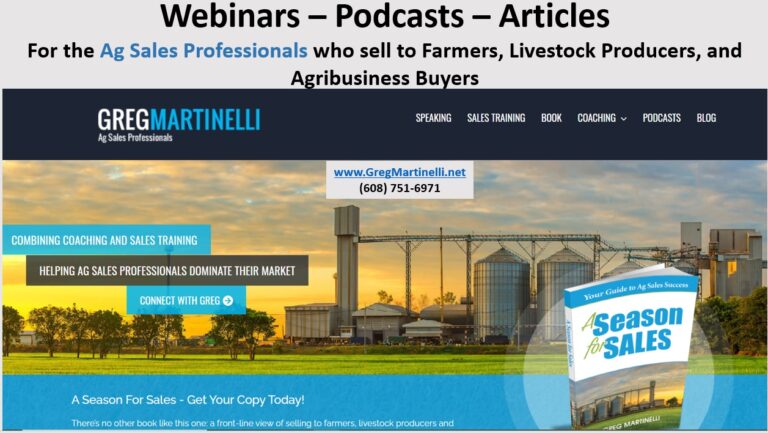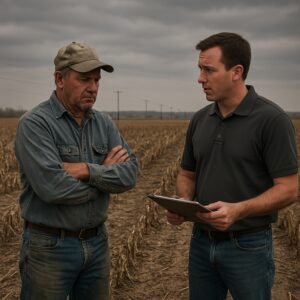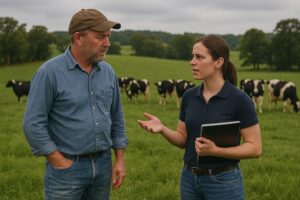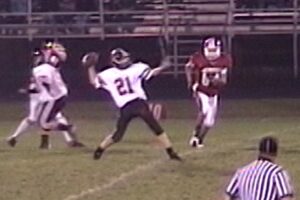Surviving Impaired Drivers, Fidgety Horses, Limb Crushing Equipment and Strange Customers!
We are all aware that farming of any kind is one of the most dangerous professions in business. However, those of us that are lucky enough to go out every day and sell to farmers and agribusinesses are often subjected to those very same, unsafe environments. While it typically doesn’t make the news when a salesperson is hurt in farming, trust me, it happens. More importantly, these accidents are avoidable.
As a sales manager, I was lucky enough to work for a company that not only preached safety but believed it and lived it from the top all the way down and through the organization. In addition to all those years of an ingrained safety culture, my dad was a production manager in an airplane factory. He lived safety in everything he did including herding six kids through the ’60s and ’70s. So, I have lived a safety culture my entire life. After hanging out at my house with my family, and hearing about how dangerous things are, one of my friends said, “Greg, until I met your dad, I didn’t realize so many things could kill you!”
So, after a lifetime of hearing it from my dad and 24 years at work, I really do think it’s worth a little space this week.
Sales Safety on Farm Calls:
- Animals: We work with them and around them on almost every farm call we go on.
- Dogs – Just assume every farm has one or more dogs.
The big, bad dogs: Making cold calls on horse farms can be challenging to find owners. In one experience, I saw a pick up out front at a barn. Assuming someone must be in the barn, I stopped and began walking into the aisle between stalls. From the far end, two Rottweilers bolted into the aisle. I was lucky enough to get to my car before they did.
The yappy yard dogs: However, my only real bite came from a border collie yard dog that wasn’t aggressive until I knocked on the customer’s door.
- Horses – Let’s suffice it to say, they scare the hell out of me just because of their absolute brute power and unpredictability. I’ve seen the YouTube videos of people being kicked and there are not enough sales in the world worth having that happen to me. However, one windy day, a salesperson I was working with was weigh-taping several horses. Not thinking, I jumped in to help. Pulling out my own weigh tape, which looks like a tailor’s measuring tape, I shook it out in the wind to unwind it. The horse alerted, ears went back and it nervously fidgeted. All of this went on without my awareness. My fellow salesperson made me very aware that I was really close to getting kicked. I was never sure if she meant by her or the horse.
- Cattle: Obviously, we are all smart enough to know the bull is a very dangerous animal that we should not be in a pen with. But, don’t turn your back on the cow either. It’s often the protective momma cow that kicks the snot out of the unsuspecting more often than a bull.
- Equipment: There were too many close calls or “near-misses” to write about. So, I’ll just list some of the more dangerous that I experienced over the years:
- Wiring: open sockets, wires in water, hanging live wires, overloaded sockets, extension cords in every state of disrepair you can imagine.
- Tractors & forklifts: being around them is bad enough, but I enjoy the opportunity to jump on and use power equipment. Here’s my advice, “Don’t”. Unless you are extremely familiar with this exact piece of equipment, don’t do it.
- Mixers, grinders and other things that chop things: Once taking a tour of a local feed mill prospect, we passed by an open-top ribbon mixer. I couldn’t help myself and stopped to discuss how crazy it is that employees were working around an open mixer. Result? I didn’t get the sale and I didn’t care as it had to be said.
- Bins: Grain bins, silage piles, or any other large collection of a commodity are entrapments waiting to happen. Be on high alert when near them! Remember, gravity! Anything high in the air can and will fall.
- Driving: This one is a huge area of safety for ag salespeople. In a production facility or a company office, we can control the environment fairly well to make it safe. On the open road, we have distracted, drunk drivers on icy, snowy roads in rain and foggy conditions. Add in traffic and more dashboard dials than an F-15 cockpit and you have a recipe for disaster at any moment. While we feel it’s always those idiots on their phones who don’t know how to drive, we don’t hesitate to think our phone call or our urgent need to swerve across 4 lanes of traffic is perfectly understandable.
Every year about this time, the summer heat gives way to Fall and then we get that first snap of ice and snow. Further north, it might be mid-October. For others, it might not happen until November or December. It would happen every year on Highway 90 which ran north from Illinois into Wisconsin. That state line area was like a weather line. Cars going full speed, often on cruise control would hit the ice and snow at about the state line, causing multiple accidents.
After spending 4 years in Alaska and 20 years in the northern US, here’s my take on salespeople driving in bad weather. “Don’t!” You’re not saving lives nor delivering organ transplants. Your customer will be there tomorrow or the next day and will certainly understand the need to reschedule an appointment.
- Customers: Yes, believe it or not, customers can pose a danger. Now most customers are safe and don’t pose a threat. However, we sell into a very stressful business environment. In addition, most of our calls are remote, few people know where we are and I found most customers have guns. While I have never been physically threatened by a customer, I know several people that have. This usually happened when they went out to collect on a past due invoice.
During the drought of 2012, I worked with a team that originated grain from farmers in the Midwest. They had forward booked grain that simply did not grow. Just about every salesperson had multiple customers that broke down in tears at some point over their inability to deliver on their contracts. Some customers responded to this stress with blame. The government and big Ag companies were often the targets of that blame. As a sales team, we had multiple discussions about showing empathy, avoiding the escalation of a highly emotional encounter and gaining a really good understanding of how to use crop insurance helped prepare our team for these conversations.
One last area of safety that I dealt with centered on the women that I worked with over the years. Now, I have to admit, I never experienced what they did, but I did share their concerns. As Ag salespeople, we work in remote areas, with spotty cell coverage and with customers that can act on a range from courteous and respectful to rude, offensive and downright creepy. There is a whole complex of issues that saleswomen face in this situation. My advice was always based on their safety. First, if you don’t feel right about the situation or customer, get out, quickly. Second, if a customer is not respectful or worse, then you never have to call on them. Depending on the situation, we dealt with it in a variety of ways, which ranged from confronting the issue to cutting them off as a customer. I was lucky enough to work with some very talented women who handled these situations appropriately and I only had to get involved on a few occasions.
Safety is often one of those areas that takes a back seat in the sales world, which is unfortunate due to the number of risks we face. Take just a few minutes today and think about the environment you will encounter. From the drive to the equipment to the animals to even the stressed-out customers you will meet. What might happen? What could go wrong and how should I react? What can I do to avoid those dangers? Then read the poem below and learn how you can speak up to help someone else today.





